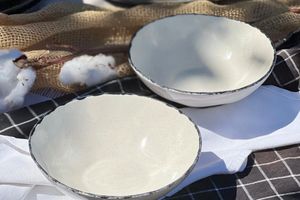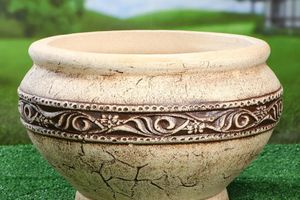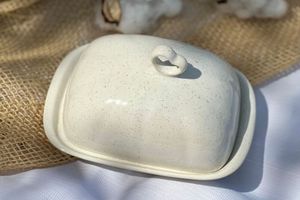Ceramics, as a material used to make tableware and other household products, plays a significant role in reducing plastic waste. In a world where environmental issues are gaining critical importance, replacing plastic with ceramic products is an important step in the direction of sustainable development. Let's take a look at how ceramics help reduce plastic waste and why it matters.
Reasons why ceramics help reduce plastic waste
1. Durability
Ceramic dishes are much more durable than plastic ones. It is resistant to wear, does not lose its properties over time and can serve for decades. This reduces the need for frequent replacement of products, which in turn reduces the amount of waste.
Durability: Ceramics can withstand high temperatures, mechanical loads and chemical influences, which makes it ideal for everyday use.
Fewer replacements: The durability of ceramic products means they need to be replaced less often, reducing the amount of waste that ends up in landfills.
2. Environmentally friendly production
Ceramics are made from natural materials such as clay and minerals, which makes them an environmentally friendly product.
Less energy: The production of ceramics generally requires less energy compared to the production of plastics.
Non-toxic materials: Ceramic products do not contain toxic chemical compounds that can pollute the environment when decomposed.
3. Absence of microplastics
Plastic products, especially single-use products, can break down into tiny particles known as microplastics, which end up in water bodies and soils, contaminating them. Ceramics, on the other hand, do not break down into harmful elements.
Safe material: Ceramics do not break down into micro-particles that can enter ecosystems and the food chain.
Keeping clean: Using ceramics reduces the risk of microplastics entering water bodies and soils.
4. Multiple use
Ceramic cookware and products can be reused many times, making them a better choice compared to single-use plastic products.
Reducing waste: Ceramics help reduce waste generation through their ability to be reused.
Supporting sustainable consumption: Using ceramic products instead of plastic supports the concept of sustainable consumption, which is an important aspect of green living.
How ceramic products reduce the demand for plastic
1. Popularity of reusable tableware
The growing popularity of reusable tableware for eating and drinking in public places and at home is helping to reduce the use of single-use plastics.
Ceramic cups and plates: Using reusable ceramic tableware at home and at work reduces dependence on plastic counterparts.
Ceramic containers: Ceramic food storage containers are an environmentally friendly alternative to plastic containers.
2. Change in consumer habits
Modern consumers are increasingly paying attention to the environmental friendliness of the products they buy. This encourages manufacturers to replace plastic with ceramics and other environmentally friendly materials.
Demand for eco-friendly products: The growing demand for eco-friendly products is driving the expansion of the range of ceramic products on the market.
Conscious consumption: People increasingly make choices in favor of ecological materials, being aware of their impact on the environment.
Examples of plastic waste reduction using ceramics
Ceramic coffee cups instead of disposable cups:
Many coffee shops offer discounts for the use of reusable cups, which encourages a reduction in the use of single-use plastic.
Ceramic tableware for picnics and parties:
The use of ceramic dishes at events helps to reduce the amount of waste from disposable plates and glasses.
Ceramic water bottles:
Reusable ceramic bottles are an excellent alternative to plastic bottles, reducing the volume of plastic waste.
Conclusion
Ceramics play an important role in reducing plastic waste by offering an environmentally friendly and durable alternative to plastic products. Thanks to its natural properties, durability and reusability, ceramics contribute to sustainable consumption and environmental protection. As consumers become more aware of the environmental impact of their choices, ceramic products will continue to play a key role in reducing plastic waste and saving the planet.









































